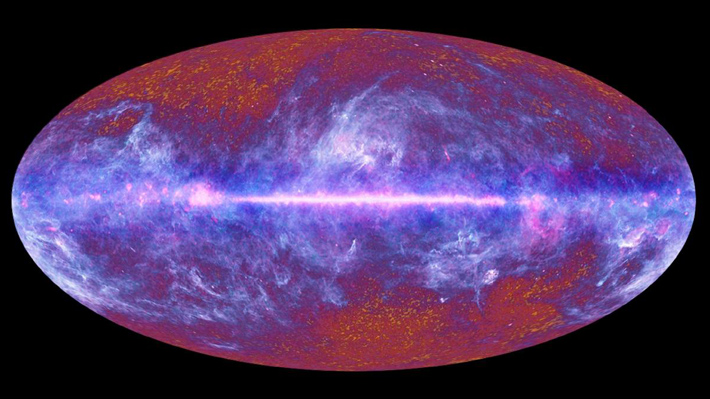The seventeenth edition of the annual International Conference on Particle Physics and Cosmology - COSMO 2013 - was held at the Centre for Theoretical Cosmology, Cambridge, UK in the week of September 2-6, 2013.
The COSMO series is one of the major venues of interaction between cosmologists and particle physicists. The year 2013 being the year of the first release of cosmological results from the Planck satellite, it was more important than ever to encourage such interactions between the fields. COSMO 13 had an excellent line-up of plenary speakers. Some of the topics discussed at COSMO included:
- Results from the Planck satellite
- Results from the Large Hadron Collider
- The large-scale structure of the Universe
- Cosmic acceleration
- String cosmology
- Primordial cosmology
- Numerical cosmology
- Particle astrophysics
- Dark matter
A list of speakers at the conference:
Cliff Burgess (McMaster/Perimeter)
Joseph Conlon (University of Oxford)
Ed Copeland (University of Nottingham)
Claudia de Rham (Case Western Reserve University)
Jo Dunkley (University of Oxford)
Richard Easther (University of Auckland)
George Efstathiou (Instute of Astronomy)
John Ellis (King's College London)
Malcolm Fairbairn (King's College London)
Thomas Hertog (University of Leuven)
Lam Hui (Columbia University)
John Kovac (Harvard University)
Ofer Lahav (University College London)
Liam McAllister (Cornell University)
Slava Mukhanov (Munich/New York University)
Silvia Pascoli (Institute for Particle Physics Phenomenology, Durham)
Ue-Li Pen (Canadian Institute for Theoretical Astrophysics)
Andreas Ringwald (DESY)
Uros Seljak (University of California, Berkeley)
Lars Sonnenschein (CERN)
David Spergel (Princeton University)
Ben Wandelt (Institut d'Astrophysique de Paris)
Simon White (Max Planck Institute for Astrophysics)
Matias Zaldarriaga (Institute for Advanced Study)
In addition to the scientific conference, COSMO 13 featured a public symposium at Lady Mitchell Hall with a series of high-profile speakers, including:
A PDF poster for the conference can be downloaded here.
The conference talks (including the public talks) can be viewed here.
Planck and the Cosmic Microwave Background
COSMO 2013 was one of the main events at which the new Planck data was discussed. A whole day was dedicated to results from the Planck experiment. Leading figures from Planck Collaboration participated.
It is without question that the mapping of the Cosmic Microwave Background (CMB) anisotropies by the many ground- and space-based experiments is one of the greatest achievements in experimental astrophysics in the past two decades. The discoveries of cosmological spatial flatness, highly Gaussian and adiabatic perturbations, are great successes individually. Together, they point to an inflationary paradigm of the early universe. In the next decade, we expect to possess a full sky cosmic variance limited map of the temperature anisotropies to smaller than 0.1 degrees in resolution and possibly a hint of the B-mode polarization. The CMB continues to be unmatched as a statistically clean probe of the early universe, allowing us to test for the Gaussianity of the anisotropies, investigate the fundamental theories at the highest energy scales, search for galaxy clusters via the Sunyaev-Zeldovich effect, among other things.
Our plenary speakers on CMB-related topics included George Efstathiou, Jo Dunkley, John Kovac, Ben Wandelt and David Spergel.
LHC and Particle Physics
The discovery of the Higgs-like boson this year has been a milestone in the history of particle physics. COSMO 2013 featured a talk from the CMS Collaboration reviewing the status of the LHC experiment. There were also theory talks discussing the implications of the LHC results for both particle physics and cosmology, and contributions in particle astrophysics such as talk on dark matter, neutrinos and axions.
Our plenary speakers on particle physics-related topics include John Ellis, Lars Sonnenschein and Silvia Pascoli.
Large-Scale Structure
Galaxy surveys play an important role is furthering our understanding of the formation of large-scale structures. Ultra-large 3-D datasets of the sky to redshifts of 6 and beyond will enable us to accurately reconstruct the evolution of the cosmological background and its matter perturbations through measurements of galaxy and cluster correlations, weak lensing shear/convergence maps and baryonic acoustic oscillations. These are multi-prong probes into the understanding of the origins and mechanisms of large-scale structure formation – a direct way of testing the nature of dark energy/modified gravity and constraining the spectrum of primordial perturbations. At higher redshifts, preliminary theory and experimental work is being laid out to map out the spectrum of 21cm lines – allowing us to see the universe during its so-called Dark Ages where the density perturbations are still roughly linear. This promises to revolutionize cosmology by its sheer amount of extractable information. The latest results from the SDSS Collaboration were presented at COSMO 2013.
Our plenary speakers on LSS-related topics included Uros Seljak, Simon White, Ue-Li Pen, Matias Zaldarriaga and Andreas Ringwald.
Inflation and Primordial Cosmology
Inflation is the leading candidate model for the very early universe. Precision cosmological observations in the last decade have verified several predictions of the simplest inflationary model. Namely, the density perturbations which have seeded structure formation are primordial, approximately scale-invariant, Gaussian and adiabatic. Despite this progress, inflation remains a paradigm with many model details still elusive. Recent developments in model building have revealed a variety of observable features linking observables to the underlying fundamental physics. This includes properties of models that predict a large tensor mode, observable non-Gaussianities as probes to inflaton interactions, consequences of reheating on cosmic strings and gravitational waves. The results from Planck satellite provide an order-of-magnitude improvement on many observables and address precisely these questions. COSMO 2013 featured theory talks discussing the implications of the Planck results for inflation and early universe cosmology more generally.
Our plenary speakers on primordial cosmology included Liam McAllister, Cliff Burgess, Slava Mukhanov, and Thomas Hertog.

The first release of the results from the European Space Agency's Planck satellite were discussed at COSMO 2013. (ESA)

